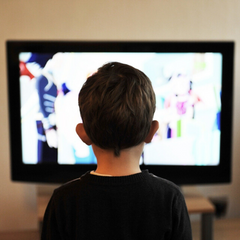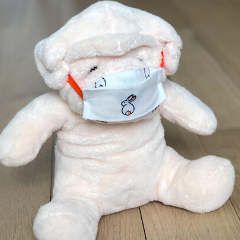Today, we will talk about the role of the comforter in confinement with our guest, Doctor Anne Dumont.

La Pelucherie : Anne, in a few words who are you?
Anne : I am Anne Dumont, doctor, child psychiatrist and specialist in mother-baby bonds.
La Pelucherie : By way of introduction, could you tell us what is the place of the cuddly toy in a situation of confinement?
Anne : During the period of confinement, the rhythms and benchmarks change: the children are permanently exposed to their parents and the latter are not necessarily in their usual state. Parents often hide their emotions because they are anxious about the situation: fears can be related to their job, fear that the virus will enter the house, etc. All this emotional bath means that children need more attention, and need, probably more than usual, to regulate their emotions. The cuddly toy therefore has a mediating role in this situation: it helps soothe the child in the midst of all these anxiety-provoking emotions. Children perceive their needs, so they take their cuddly toy when they feel the need. It should come as no surprise, however, that they need it more than usual.
La Pelucherie : Today, parents are more or less stressed. There's a new rhythm to be found with the children, so it's probably this change that disturbs them too...
Anne : Exactly, the house is like a sanctuary for the child. It is a haven of peace, a sacred place. Work, the children accept it if it is something that is usually present at home. If teleworking has been implemented abruptly, without explaining it to the child and in a very repeated and intense way, the child, whatever his age, will feel that this work is intruding on his sanctuary. He has the feeling that his parent and his private life are being stolen from him, and this can have very harmful effects for him: he can feel threatened, anxious, especially since his parents are undoubtedly even more stressed to see their child to be afraid, which increases the anxiety-provoking climate around him. All this can cause sleep or behavioral problems in the little one.
Anne : In addition, in general, when you have to telecommute, you have to do it 100%. My advice would therefore be to alternate teleworking between the two spouses, or in a single-parent family situation, to request sick leave in order to be able to take care of the child(ren). It is very harmful for the little ones to have a parent who does not have a sufficient quality of presence. Teleworking is therefore very good when you can organize yourself in order to have real quality periods with the children.
Anne : I'm also taking this opportunity to make a small transition… We all tend when we telecommute to put our children in front of the television. But the TV nanny is very harmful: we don't control what the children see or the time they spend there. You should also know that when they watch TV, the little ones will be overstimulated via reflex attention. Therefore, they will be less able to mobilize their selective attention, which they use in particular to draw, etc. This will therefore eat into quality attention time. So you have to be very careful with TV… Especially since another problem with TV is that of the news channels which constantly rehash extremely anxiety-provoking news. If you want to get information, prefer the online press.

La Pelucherie : And it's also better, I imagine, not to work in the same room as the children's...
Anna : Yes. We can also draw a parallel with the generations before: in peasant families, parents often worked in the fields with their children next to them, and the little ones took care of themselves. But the parents could always keep an eye on them. In a teleworking situation, we do not have this possibility because we must be 100% focused on our task, especially if we are online with a client or a colleague. The little ones also know on their side that they are "released" in a certain way.
La Pelucherie : And is it good to change daily rituals to adapt them to the rhythm of confinement?
Anne : I think it's best to keep the rituals as fixed as possible. We also have to adapt, but it's important to keep something constant that allows the child not to ask too many questions. I advise you to keep the same bedtimes, the same nap times and the same meal times.
La Pelucherie : Even if they don't sleep, let the weather calm down...
Anna : Exactly. Also keep in mind that if there are a little more intensive times in the games, it will probably be easier to get the child to accept a rest period afterwards. I also recommend going out if you live in a small place with no exterior, because it's very difficult for children not to get some fresh air and feel free.
La Pelucherie : And if we ever have to go out, can the cuddly toy come with us?
Anne : Of course, the cuddly toy is like an extension of the baby, so of course!
La Pelucherie : On another subject, how to help children prepare for deconfinement?
Anne : We have to help them not to be afraid by reassuring them about how the school will welcome them, about how the measures are justified, etc.
La Pelucherie : And how do you deal with masks?
Anne : I recommend familiarizing them with the masks now, so that they are not surprised when they go out to see all these adults wearing them. We can also put on a comforter mask to popularize the thing… And also think about encouraging children to always wash their hands after meals, activities, etc.

La Pelucherie : And what words to use to avoid scaring them?
Anne : We have to be honest, children are people and we owe them the truth. We can talk to them about the fact that this disease causes death, however we must also mention that there are deaths every day, except that we don't talk about it. Being able to play it down is important. We also have to explain to them what germs are: very small animals that we cannot see but which can attack our bodies. But when we talk to them about it, we must always counterbalance by mentioning that we also have little soldiers in our body that allow us to defend ourselves against the virus, and that if they are not enough, we can always go see a doctor to prescribe medicine to help us fight the disease. On this point, I recommend the cartoon Once Upon a Time .
La Pelucherie : A subscriber also recommended Tony Ross's book, Wash Your Hands – The Little Princess , which deals with the subject of microbes. And on another subject, Cœur d'Artiflo has made drawings available online on barrier gestures.
La Pelucherie : Perhaps also that if you are an adult with a rather anxious nature, it is better to explain to the child directly the nature of our fear in the face of this crisis...
Anne : It's true that as an adult we have the impression that we shouldn't put words to our emotions. Except that by not saying these things, we favor the fact that the child imagines himself what scares his dad or his mom. However, children always imagine the worst… It is therefore better to tell them directly that you are anxious so that they too accept being afraid.
La Pelucherie : A question from an Internet user: in the event of night terrors, is it a good idea to put a mattress for the parent at the bedside of the child until the situation calms down?
Anne : If these night terrors are new, it is very important to reassure the child during waking times. At night though, try not to change things up too much as this may cause the child to see them as new habits. We must avoid deviating too much from the usual rituals. Parents must also take care to preserve their private sphere, and this is also valid during periods of confinement. We can nevertheless find rituals such as herbal tea before bedtime to have a transition time between waking and night shared by the parent and the child. These types of rituals make it possible to soothe the child before falling asleep.
La Pelucherie : I think you answered all our questions… Thank you very much for enlightening us!
